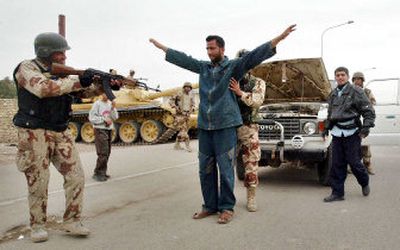Senior al-Qaida insurgent captured

BAGHDAD, Iraq – Iraqi security forces announced Monday the capture of a senior figure in al-Qaida in Iraq, and the U.S. ambassador said the risk of civil war from last week’s sectarian violence is over.
Violence throughout Iraq killed 36 people Monday as fierce fighting broke out between Iraqi commandos and insurgents southeast of the capital.
But sectarian clashes have declined sharply since the bloodletting that followed the destruction of a revered Shiite shrine in Samarra, and Baghdad residents returned to their jobs after three days of a government-imposed curfew.
“We were at home for three days doing nothing,” tea vendor Abbas Kudir said. “We are of limited income. We earn money when people can buy tea normally. We hope the government will pay attention to our difficulties.”
Sunni Arab leaders said they are prepared to end their boycott of the talks on a new government if Shiites return mosques seized in reprisal attacks against Sunnis and meet other unspecified demands.
“That crisis is over,” U.S. Ambassador Zalmay Khalilzad said.
“I think the country came to the brink of a civil war, but the Iraqis decided they didn’t want to go down that path and came together,” the ambassador told CNN. “Clearly, the terrorists who plotted that attack wanted to provoke a civil war. It looked quite dangerous in the initial 48 hours, but I believe the Iraqis decided to come together.”
The captured al-Qaida figure was identified as Abou al-Farouq, a Syrian who financed and coordinated groups working for Iraq’s most-wanted terrorist, Abu Musab al-Zarqawi, in the insurgent stronghold of Ramadi, according to an Interior Ministry officer who spoke on condition of anonymity because he is not authorized to address the media.
Acting on a tip from residents, members of the Interior Ministry’s Wolf Brigade captured al-Farouq with five other followers of al-Zarqawi near Bakr, about 100 miles west of Baghdad, the ministry said.
The Defense Ministry said Iraqi security forces have killed 35 insurgents and arrested 487 in raids across the country since the bombing last Wednesday of the Samarra shrine.
The Shiite-Sunni violence threatened U.S. plans of a broad-based government capable of luring Sunni Arabs away from the deadly insurgency so coalition troops can begin heading home.
Adnan al-Dulaimi, whose Iraqi Accordance Front spearheaded the Sunni walkout from the talks, said Sunnis are “intent on participating” in a new government but are holding out for “some conditions” to be met.
The U.S. State Department praised the Sunni leadership as “looking to get back into the game, full strength,” and brushed aside the additional demands.
The speed with which sectarian attacks spread from Samarra to Baghdad and Shiite strongholds in southern Iraq had raised concern about the ability of Iraq’s understaffed and ill-equipped security forces to handle the crisis.
Sunni leaders accused the Shiite-dominated police and army of standing by as Shiite militiamen sprayed Sunni mosques with machine-gun fire and took over some of them. More than 200 people were reported killed in sectarian violence.
The Defense Ministry countered Monday that a curfew in Baghdad and three surrounding provinces had curtailed the violence.
U.S. helicopters fired on three houses 15 miles west of Samarra and arrested 10 people, Iraqi police said. It was unclear if the raid was linked to the shrine bombing. The U.S. military did not comment immediately.
The U.S. military said an American soldier died from noncombat-related injuries suffered Friday north of Baghdad. The statement did not elaborate. Three soldiers were killed Sunday in combat operations in the capital.